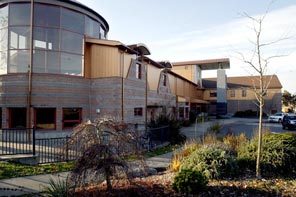Excerpt From an Open Letter to Arne Duncan from Herb Kohl
We have come far from that time in the '60s. Now the mantra is high expectations and high standards. Yet, with all that zeal to produce measurable learning outcomes we have lost sight of the essential motivations to learn that moved my students. Recently I asked a number of elementary school students what they were learning about and the reactions were consistently, "We are learning how to do good on the tests." They did not say they were learning to read.
It is hard for me to understand how educators can claim that they are creating high standards when the substance and content of learning is reduced to the mechanical task of getting a correct answer on a manufactured test." (Summer 2009)
Nova High School Relocated

Merit Pay
Laurie, in response to R. Weingartner, On Point, 1/26/10
Merit pay is an issue that is closely associated with charter schools and is a reiteration of the No Child Left Behind Act.
Basically, it requires that teachers pay be based on how well their students perform on standardized tests. For our students, it could be the new MAP test. With the No Child Left Behind Act, teachers and staff were pressured to teach much of the class work to the standardized tests. With so much focus on the test, many other parts of knowledge building, creativity and understanding of subjects and their synthesis with other knowledge had to take a back seat. For many students, teaching to a test meant that they were not able to reach their full potential which would have been far beyond the level of the tests.
No one wins in this situation.
Part of the fallout also is that if a teacher's pay is based on how well their students test, many teachers will want to teach in a school where they know that the students will perform well. Those schools are, for the most part, not the schools that are predominately minority in population.
Some students do not perform well on standardized tests for many different reasons and yet a teacher's pay can be tied to that student's performance. High stakes testing also puts pressure and stress on the students who become burdened with the thought that they need to perform well on one test. The test becomes a focus with little opportunity to explore and have fun learning, creating and synthesizing new thoughts and ideas.
Update: The Governor of Texas has decided to opt out of the Race to the Top funding because of the ineffectiveness of the merit pay program that was in effect for three years inthe state.
Update: March 8, 2010 Principal to be removed from school in Wasington State due to low WASL scores.
What Is a Charter School?
A charter school can expel any student that it doesn't believe fits within its standards or meets its level of expectation in terms of test scores. If the student is dropped off the rolls of the charter school, the money that was allotted for that student may or may not be returned to the district at the beginning of the next year. That is dependent upon the contract that is established by each district.
Also, according to a recent (June 15, 2009) study by Stanford University's Center for Research on Education Outcomes (CREDO), charter schools do not necessarily perform any better than public schools. In fact, 37 percent performed worse. Forty-six percent demonstrated "no significant difference" from public schools. Only 17 percent of charter schools performed better than public schools.
Thomas Jefferson
The Broad Foundation
The Broad Foundation claims to be a philanthropic organization, created by billionaire Eli Broad.
The Broad Foundation supports privately run charter schools and actively develops a system of charter schools in urban areas.
Broad claims it engages in "venture philanthropy":
"Our Approach to Investing: Venture Philanthropy. We take an untraditional approach to giving. We don't simply write checks to charities. Instead we practice 'venture philanthropy.' And we expect a return on our investment."
Many of us have discovered the Broad Foundation's presence within SPS and are requesting an explanation for why it is here and what its' objectives are.
Seattle has three "Broad Residents", and two Broad graduates now working within SPS. One of them is our superintendent who is a graduate of the Broad Academy which trains superintendents, and is also on the Broad's Board of Directors.
Another Broad graduate and a onetime Broad resident in SPS, Brad Bernatek, is now Director of REA, Research, Evaluation and Assessment within SPS. That department is responsible for student statistics including enrollment, demographics, evaluation and standardized testing.
The Broad Foundation provided Dr. Payzant, also a Broad graduate, to be a part of our superintendent’s yearly review in 2009.
Broad recently gave SPS a $1M "gift." That money is now in the hands of the Alliance for Education and no one knows how the money is being spent.
All in all the Broad Foundation has been quite generous to the Seattle Public School system and as Eli Broad states himself, he expects a return on his investment.
Broad also supports and actively promotes mayoral control of school districts. Eli Broad's preferred model of mayoral control means that the mayor selects the school board members and superintendent who are therefore unelected and are beholden only to the mayor, not the people of the city. It then becomes a school district that is run by one person, the mayor, with heavy influence by the Broad Foundation through developed relationships with that individual.
Update: A Detroit School District employee found accepting money from the Broad Foundation.
"Let the games begin: Detroit Teachers vote to unanimously join the current Detroit Public School District in their suit against Robert Bobb".
Update: The Broad - Rhode Island connection.
Rhode Island has had the dubious distinction of making national news recently for the draconian firing/scapegoating of an entire school of teachers. Is it a coincidence that the new education commissioner for R.I., who is pushing the state to do whatever it takes to qualify for federal "Race to the Top" dollars, is a "Broad Superintendents Academy" graduate, Deborah Gist?
Dan Weil
Dollars and Sense
December, 2009
What the Gates Foundation Is Doing: The MAP Test
The Gates Foundation supports, and pays for, high stakes testing which is tied to merit pay.
The Bill & Melinda Gates Foundation has given Seattle Public Schools a total of $9M this year for additional testing. We have not been able to find out the details of this testing yet. We don't know what the test is, what the test is to determine, who is administering the test and how the results of the tests are to be used.
UPDATE: We have heard that the Gates "gift" is funding the new computerized, standardized "MAP" tests the district is administering this year to all students, from as young as kindergarten to grade 9. MAP stands for "Measures of Academic Progress™" (yes, it is a trademarked product) and will be administered to the kids three times during the school year. The test can take as much as two hours each session, according to the district's official announcement letter.
A number of questions come to mind: Is this the best use of the students' school time? Is it appropriate to make children as young as five who can't read take a standardized test on a computer? Is this the best use of such funds? Or would parents, students and teachers prefer to see money channeled more directly to the classroom, to create smaller class sizes, more enrichment opportunities, or to purchase new textbooks?
A SIDE NOTE: Another interesting connection is that our superintendent, Dr. Goodloe-Johnson, is on the Board of Directors for the company that has created and distributes the MAP test. There is $4.3M in the levy to pay for additional use of this MAP test in Seattle.
The Cooper Building: Program DIscontinued, 2009

Regarding Arne Duncan's Renaissance 2010
Most of the new experimental schools have eliminated the teacher union. The Commercial Club hired corporate consulting firm A.T. Kearney to write Ren2010, which called for the closing of 100 public schools and the reopening of privatized charter schools, contract schools (more charters to circumvent state limits) and "performance" schools.
Kearney's web site is unapologetic about its business-oriented notion of leadership, one that John Dewey thought should be avoided at all costs. It states, 'Drawing on our program-management skills and our knowledge of best practices used across industries, we provided a private-sector perspective on how to address many of the complex issues that challenge other large urban education transformations.'
Duncan's advocacy of the Renaissance 2010 plan alone should have immediately disqualified him for the Obama appointment."
Henry Giroux & Kenneth Saltman,
Obama's Betrayal of Public Education?
Truthout
The African American Academy: Closed 2009

Alternative Schools in Seattle
At this time, the alternative and nontraditional schools in Seattle are basically under siege. Many schools have been closed, marginalized or split apart, including the Accelerated Progress Program (APP) for highly gifted kids, the Center School, Nova, Summit, the African American Academy, SBOC and AS-1. There is also a plan for an Alternative School Audit by SPS in October, 2009.
We see these alternative programs as viable options to the traditional school approach to education. For this reason many of us believe that with the support of these programs, there is no need for privatized charter schools.
Governor Gregoire and our state representatives are speaking to Arne Duncan about our alternative schools and that they meet the requirement of charter schools and should be considered in providing Race to the Top funds to our state.
Summit K-12: Closed 2009

An alternative school
Please Note
Meg Diaz, a parent, did a brilliant presentation to the school board in January regarding the school closures, the demographics of Seattle and why it didn't make sense to close the schools.
See: http://sites.google.com/site/seattleschoolsgroup/meg-diaz-analysis
Unfortunately, the school board paid no attention to Ms. Diaz or their own reports and instead chose to believe the numbers presented by the superintendent's CFO, Don Kennedy who previously worked with our superintendent in Charleston, and Brad Bernatek our Broad graduate and Director of REA, Research, Evaluation and Assessment who also handles the demographic data for SPS.
Two schools were closed that, per their own report, would see an increase in school aged children of anywhere between 31%-100% between 2008 and 2012. See page 11 of the DeJong report titled "Seattle Public Schools: Enrollment Projections Report". Those two schools were TT Minor Elementary School and Meany Middle School.
After the closures, Ms. Diaz decided to investigate the administrative cost within the Stanford Center and came up with surprising results. While the superintendet was rifing teaches and staff and closing schools, staff was growing within the Stanford Center and particularly in our superintendent's office where yet another Broad graduate was hired as one of the superintendent's administrative assistants.
Posted on October 6, 2009: The new assignment plan just came out and the proposal is to re-open five school buildings. Between closing five school buildings, shuffling students to different schools and now proposing the re-opening of five buildings within a year's time speaks volumns about the lack of competency of our superintendent and her chosen staff.
We have now wasted money closing five schools, moving students, equipment and materials around just to re-open five school buildings.
The cost of re-opening five of these buildings is as follows:
Sand Point: $7M
Viewlands: $11M
Old Hay: $7.5M
Mc Donald$: $14.9M
Rainier View: $7.4M
Total so far: $47.8
The superintendent, along with the school board, plan to take the next capitol levy money, BEX III, to be voted on in 2010 that was to go to the maintenance and seismic upgrades of our school buildings, which would make them safer, and instead use the money to re-open these previously closed buildings.
The decision to close schools last year and close or relocate programs came down from our superintendent's office quickly and there was little time for debate or understanding of what the ramifications would be. It is my opinion that again, we need to have time to evaluate what cost can wait and how these cost can be phased so that we can not only make our existing buildings safer but also provide adequate space for all of our students.
There is also stimulus money that other school dristricts have been able to acquire to upgrade their school buildings through FEMA grants. These grants, part of a Disaster Mitigation Fund, are being used to make school buildings safer. I had presented this information to the school board and superintendent but no action was taken at the time.
I will provide updates on the effort to once again get SPS to pay attention to this opportunity.
Please send comments or ideas to us or share your opinions below. We want to hear from you. All positive and constructive input is of value.
DT
Priscilla Gutierrez, Huffington Post comment
Lowell Elementary

The Lowell APP program was split with half of the students sent to Thurgood Marshall.
Our Declaration
In the current national discussion about education reform, the loudest voices are not necessarily those of the people who are directly affected by what happens in our schools – the students, parents, teachers and school communities themselves.
We are parents with children in public schools. These are our kids, their teachers, our schools. And we would like to be heard.
What’s more, the message coming from the current league of reformers is largely negative, much talk about what’s wrong with our schools, but little discussion of what public schools and teachers are doing right, and what they could do even better if given full support.
Can our public schools be improved? Absolutely. But that begins with fully funding our schools and believing they can work.
We believe they can, when given the chance.
We also believe that too many of the latest proposed education reforms are too punitive and are not changes for the better.
We believe there are valuable aspects of public education worth preserving and supporting, beginning with the very principle itself – free public education for every child in the country. We believe this has always been a noble goal and one that we’re not willing to give up on.So we have created a Declaration of Support for Public Schools.
We invite others across the nation who share our vision for public education to sign on to our statement, to send a message to the president, education secretary and school district officials throughout the country.
The message is simple:
Let’s fix what’s broken, but don’t break what isn’t.
And do not impose detrimental changes on our schools and children in the name of “reform.”
Sincerely,
Sue Peters, Dora Taylor
Seattle Public Schools parents
May 2010
Friday, October 16, 2009
The Alliance and the NCTQ Study
http://www.nctq.org/p/publications/docs/nctq_seattle_human_capital.pdf
Economic definitions for the word “capital”:
“Capital is something owned which provides ongoing services. In the national accounts, or to firms, capital is made up of durable investment goods, normally summed in units of money.”
“In economics, capital or capital goods or real capital refers to factors of production used to create goods or services that are not themselves significantly consumed (though they may depreciate) in the production process. Capital goods may be acquired with money or financia capital. In finance and accounting, capital generally refers to financial wealth especially that used to start or maintain a business.”
On the cover of this report, teachers, the human beings who teach our children every day, watch them grow and develop, use their own money to pay for materials because the district doesn’t have the money to provide those additional resources, are referred to as “capital”.
This is the business perspective that has been the model for the Broad Foundation and Gates in terms of how they think schools should be run and children taught.
This report was sponsored by the Alliance for Education and has received funds, $9M from Bill Gates and $1M from the Broad Foundation. Some of that money was used to pay for this report as is described on page 2.
This report is a precursor to merit pay, high stakes testing and ultimately charter schools. This has been the method that the Broad Foundation and Bill Gates have used in other school districts around the country to introduce their ideas of “venture philanthropy” in our educational system.
I’ll hit some of the highlights.
"About this study:
This study was undertaken on behalf of the 43,000 school
children who attend the Seattle Public Schools."
Or on behalf of Bill Gates? I didn't know that the students and parents of the Seattle School District or any school board members asked for this study.
"Partner and local funder
This report is funded by a grant from the Alliance for Education.
Additional funding was provided by the Bill and Melinda Gates
Foundation."
Well, we got that straightened out.
“Excessive emphasis on coursework. Most notably Seattle’s pay structure is built on a popular but erroneous premise that the more coursework a teacher takes, the more effective he or she is likely to become. Districts that heavily incentivize teachers to take more courses—and Seattle is in the extreme among the 100 districts we track closely—are making poor choices with their limited resources.”
“A popular but erroneous premise” that furthering the education of teachers through workshops and classes on the subjects that they teach is somehow a waste of time and money? Is there (yet another)study that has been done to substantiate this?
“Little experimentation with differential pay. The district could make much better use of funds available for teacher salaries by targeting three important but unaddressed areas of need for the district…more money to teachers who are highly effective”
This is where it starts sounding like an introduction to high stakes testing and merit pay.
“Seattle needs to collect important data on teachers, such as the number of times it takes a teacher to pass licensing tests and scores on aptitude tests, to ensure that teachers are equitably distributed among schools.”
I can only relate to this as an architect but it takes some if not most architectural graduates a few times of taking the licensing exam to pass it. No one would ask an architect how many times they had to take the test before successfully completing it. A client or employer is only concerned with that fact that you are licensed. And scores on aptitude tests? This is all “important data”? Are they suggesting yet more testing and evaluations? And then the exercise to evenly distribute these teachers based on this data to different schools? Trying to accomplish that would be an exercise in futility and an expensive one at that. They can’t be serious with that idea.
“District-wide layoffs. With the high number of layoffs taking place in schools across the country this year, much attention has gone to the policy of using seniority as the determining factor in layoffs. A layoff policy that works in order of reverse seniority necessitates the highest number of jobs eliminated and can wreak havoc on schools, forced perhaps to give up teachers regardless of performance and often dismantling an effective team or program.”
First of all, the layoffs that occurred in the spring of this year are highly suspect. In the same school board meeting in April where Don Kennedy, the SPS CFO was giving his numbers to back up the rifs, the SPS demographer gave a presentation showing that fall enrollment was over by 1,200 students. The demographer suggested that the number would increase the closer that it got to fall. Michael DeBell asked Don Kennedy if the demographer’s numbers had been translated into his report and he said “no, they had not”. Mr. Kennedy said that he would provide those numbers in a Financial meeting in two weeks. I was in that meeting and there was never any mention about revised numbers for the rif. I went to the following school board meeting and again there was no mention of recalculating the rif numbers based on the new enrollment numbers. My belief is that the riffing of teachers and staff was an unnecessary exercise.
Secondly, this is what leads into evaluating the performance of teachers by using assessment tests. These tests are taken by the students and are used to evaluate the “effectiveness” of the teacher. A teacher’s pay is based on these test scores. This is what is called “high stakes testing” and leads into merit pay.
“Problems with the current evaluation system: Student achievement is not adequately considered nor are any objective measures of student learning considered. Student achievement should be the preponderant criterion of a teacher’s evaluation and include objective measures.”
“Objective measures” being high stakes testing.
“What Washington State needs to do
I. COMPENSATION
Washington State’s intervention on pay issues is a substantial obstacle to needed pay reforms. The state’s efforts at equalizing pay across districts are ineffective. The state should not dictate how its districts pay its teachers, particularly since the state structure is based on a flawed logic that deems teachers with the most coursework as the most effective.
The state should eliminate the salary schedule and TRI structure—and should support district efforts at creating new compensation systems that reward effectiveness or that provide bonuses to attract teachers to hard-to-staff subjects and schools.”
In how many different ways can they say “high stakes testing” and “merit pay”?
“IV. DEVELOPING EFFECTIVE TEACHERS AND EXITING INEFFECTIVE TEACHERS
Evaluations. Washington State already has a strong state evaluation policy by requiring annual evaluations of all teachers, but it should go a step further and require that all districts include evidence of student learning as the preponderant criterion in teacher evaluations.”
“Evidence of student learning” being more student testing that will determine how much a teacher gets paid. They are consistent with their message.
“Last year the district adopted a five-year strategic plan that, among other priorities, calls for better hiring of teachers and principals, system-wide student assessment, and improved teacher evaluations.”
Thanks for pointing that out to me. I had not realized that the idea of “student assessment and improved teacher evaluations” had already been brought in by our superintendent.
“Seattle faces these challenges with a teacher policy framework that has already gone part of the way toward a fully updated approach to human capital.”
I wish that they would stop referring to teachers as “human capital”.
“Seattle also acknowledges the importance of student achievement in evaluating teachers.”
They do stay on message.
“Performance pay
Seattle has been able to make little progress on efforts to reward more effective teachers. In the last round of contract negotiations, concluded in August, the district proposed a pay system that would have rewarded teachers for 1) positive evaluation; 2) student achievement growth; 3) working in a school identified for support or interventions; and 4) taking jobs that the district has a hard time filling. The proposals did not become part of the current contract.”
Go figure. I think that the teachers had an idea of where this was going. Before anyone would agree to getting paid based on “evaluations” or “student achievement growth”, they would want to know exactly what that meant.
I could keep going with this but I think that it becomes clear what this report is all about. It is introducing the idea of additional testing of students and basing a teacher’s pay on that assessment. And in the world of education that is called:
High stakes testing and merit pay,
which goes hand in hand with charter schools.
I too can stay on message.








No comments:
Post a Comment